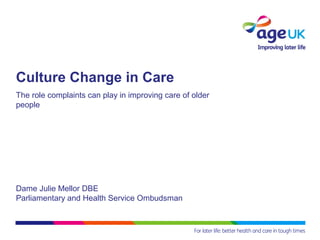Julie Mellor - Culture change in care
- 1. Culture Change in Care The role complaints can play in improving care of older people Dame Julie Mellor DBE Parliamentary and Health Service Ombudsman
- 2. The issues older people can face Inadequate personal care Poor communication with families Dehydration Lack of integrated care ŌĆśThe NHS touches our lives at times of basic human need, when care and compassion are what matter mostŌĆÖ Opening lines of the NHS Constitution Malnutrition Discharge from hospital
- 3. Care and compassion? ŌĆ£They took away every last ounce of dignity my husband had leftŌĆØ ŌĆ£It was as if he didnŌĆÖt exist ŌĆō he was an old man and was dying.ŌĆØ ŌĆ£They decided that enough was enough without bothering to include meŌĆØŌĆ£I was quite frightened. I was recovering from minor surgery. I am 82 years old and did not know how I was to get home. I asked the nurse if he could phone my daughter. He told me this was not his job.ŌĆØ ŌĆ£When she arrived at the care home, she had numerous injuries, was soaked with urine and was dressed in clothing that did not belong to her which was held up with large paper clipsŌĆØ ŌĆ£His tongue was like a dried piece of leatherŌĆØ ŌĆ£Our dad was not treated as a capable man in ill health, but as someone whom staff could not have cared less whether he lived or diedŌĆØ
Editor's Notes
- #3: Of all the complaints we receive about the NHS, around 18 per cent are about the care of older people. Older people can face a particularly unique set of issues when they need hospital treatment: Inadequate personal care At risk of dehydration Needing support with eating Picking up healthcare acquired infection Poor communication between hospitals and families ŌĆō listening and consulting, particularly on DNR capacity Lack of integrated care Fear of, or problems following, their discharge from hospital The NHS constitution has ŌĆścare and compassionŌĆÖ at its heart and most of the time it does a very good job of this. But we still receive too many complaints about older people being treated with a lack of dignity.
- #4: These are real-life quotes taken directly from some of our cases. The letters can be heart-breaking to read. IŌĆÖll pause to let you take them in. We were so concerned about the treatment of older people in the NHS that in 2011 we published a report highlighting some of the worst cases. ŌĆś Care and CompassionŌĆÖ received considerable media coverage and I am delighted to say resulted in The Commission on Dignity and Care, of which, of course Age UK was a founder member. This shows that complaints CAN make a difference. But too often we find the same mistakes from hospitals when it comes to complaint handling: Poor explanation 33% No acknowledgement of mistakes (including cover up) 32% Inadequate remedies 26% Failure to learn So how do we make this better? [ref research] Competence Confidence Culture
- #5: When a patient expresses a concern or complaint ŌĆō either on the ward or to a complaints team ŌĆō the first question asked should be: ŌĆśHow can this be put right?ŌĆÖ The next should be: ŌĆśHow can we learn from this?ŌĆÖ From ward to Board, complaints should be at the heart of improving the NHS I often use the mnemonic GRASP [talk though each point] G overnance R ecords A ccountability S tandards P ractice In summary, care can be improved by listening and learning in a complaints driven culture. This has to be led from the top downwards. Thank you.




